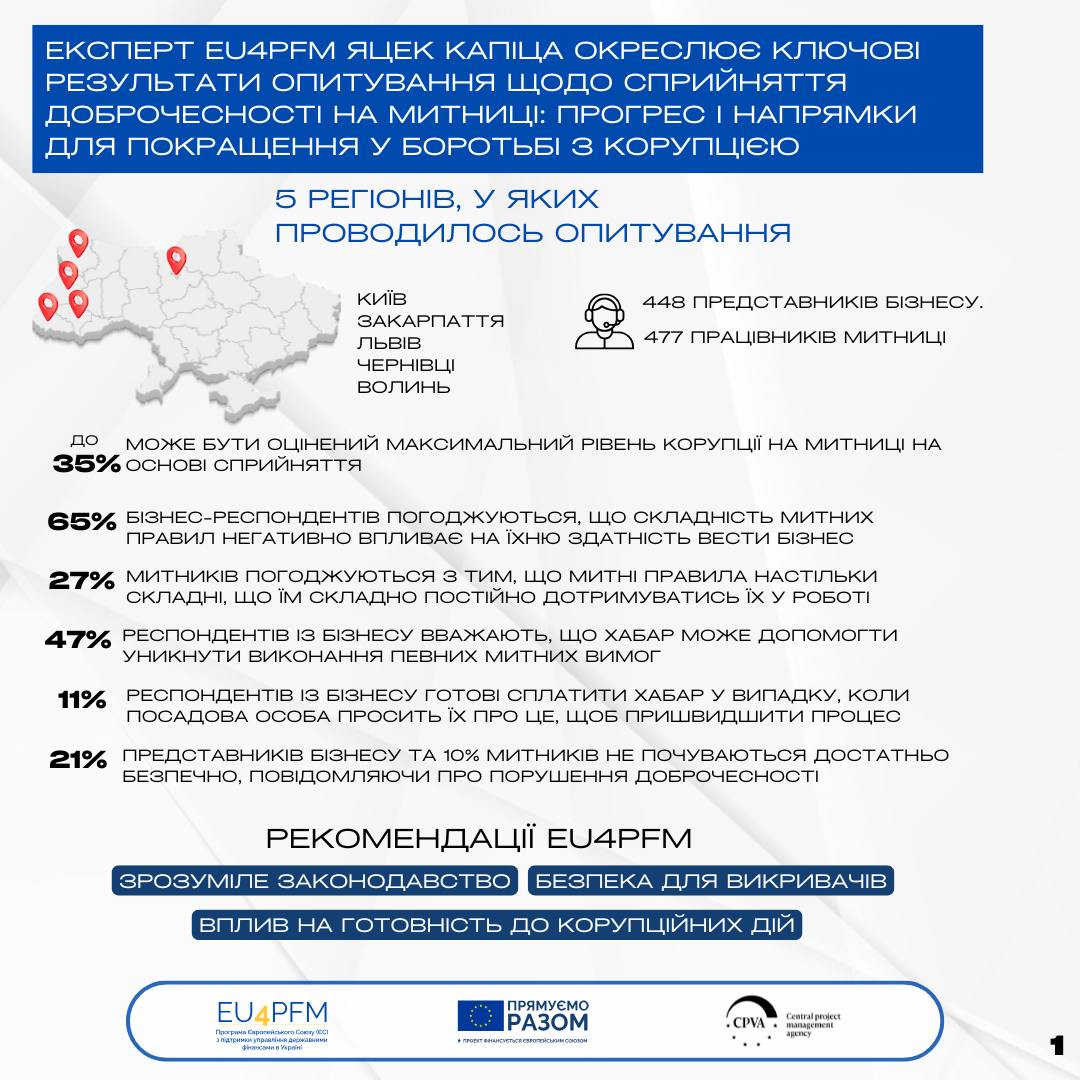Експерт EU4PFM Яцек Капіца окреслює ключові результати дослідження сприйняття доброчесності митних органів (CIPS), зосереджуючись як на прогресі, так і на сферах, які потрібно покращити у боротьбі з корупцією
Програма EU4PFM продовжує тісно співпрацювати з Державною митною службою України та її міжнародними партнерами для зміцнення доброчесності та боротьби з корупцією на митниці. Нещодавнє дослідження сприйняття доброчесності митних органів (CIPS), проведене Держмитслужбою у співпраці з Програмою боротьби з корупцією та сприяння доброчесності (A-CIP) Всесвітньої митної організації (WTO), пропонує критичне розуміння поточного стану доброчесності митниці. Опитування висвітлює як прогрес, так і проблеми, надаючи основу для реформ.
EU4PFM готова допомогти у впровадженні необхідних рекомендацій для підвищення прозорості та підзвітності митної системи України.
Згідно з висновками Яцека Капіци, міжнародного експерта EU4PFM з антикорупційних питань, що рівень корупції на митниці на основі сприйняття можна оцінити до 35%. Крім того, 65% бізнес-респондентів погоджуються, що складність митних правил негативно впливає на їх здатність вести бізнес, а 47% вважають, що хабар може допомогти їм обійти певні митні вимоги. Ці висновки випливають із дослідження CIPS, проведеному серед митників і представників бізнесу. Експерт EU4PFM з антикорупційних питань Яцек Капіца звертає увагу на ці висновки та пропонує рекомендації, а EU4PFM готова підтримати Держмитслужбу в їх реалізації.
У своєму аналізі експерт виділяє три ключові питання: «готовність» обох опитаних груп брати участь у корупційній діяльності, складність митного законодавства та безпека викривачів, враховуючи також внутрішнє митне середовище щодо питань доброчесності.
Яцек Капіца пояснює, що сприйняття корупції можна оцінити, визначивши частку бізнес-респондентів, які вважають за можливе «спростити собі життя» за допомогою хабарів. Так, 35% бізнес-респондентів підтверджують, що ухилятися від виконання митних вимог за допомогою хабарів «часто або завжди можливо»; при цьому 11% визнають, що пропонували хабарі, коли отримували такий запит від митників, щоб прискорити процедури. На думку експерта, це свідчить про рівень корупції за недотримання правил і готовність платити, коли ініціатива виходить від митника.
Аналізуючи причини ситуації, експерт звертає увагу, зокрема, на складність митного законодавства. «Коли законодавства легко дотримуватися, процедури прозорі, зрозумілі та здебільшого вільні від людського втручання, питання оплати комусь за прискорення процесу стає набагато менш актуальним», — підкреслює він.
Проте українське митне законодавство видається складним не лише опитаним представникам бізнесу – 27% митників погоджуються з тим, що митні правила настільки складні, що їм складно їх послідовно дотримуватися. А 65% бізнес-респондентів вважають, що складність митних правил негативно впливає на їхній бізнес. Тож складність митного законодавства є однією з причин, чому 11% опитаних представників бізнесу не дотримуються цих правил або часто готові це робити.
Іншим фактором, що сприяє корупційним діям, є відсутність неминучих негативних наслідків. Факти корупції лишаються нерозслідуваними або тому, що обидві сторони в ній зацікавлені, або тому, що викриття може бути, наприклад, небезпечним для викривача.
Дослідження дає інформацію про поточний рівень мотивації для викривачів та визначає сфери, які потрібно покращити. Зокрема, чи почуваються в безпеці ті, хто про ці факти повідомляють, чи очікують вони результативного розслідування, чи заохочуються такі дії керівництвом митниці. Так, 21% респондентів від бізнесу та 10% митників не почуваються безпечно, повідомляючи про порушення доброчесності.
Для компаній це занепокоєння може виникнути через побоювання щодо майбутньої безпеки діяльності після звітування. Окрім вагань повідомляти про корупцію, 16%[1] представників бізнесу не погоджуються з тим, що керівництво митної адміністрації вживає заходів проти корупції, а 10% вважають, що воно не подає позитивного прикладу щодо доброчесності.
Мотивація повідомляти про порушення корелює з іншими ключовими факторами. Наприклад, 12% митників не погоджуються з тим, що їх начальство заохочує їх повідомляти про порушення доброчесності, а 10% вважають, що повідомлення про корупційну поведінку не призводить до жодних заходів проти неї.
Тривожним сигналом є те, як відреагували б митники, якщо запідозрять колегу в тому, що він бере гроші від бізнесу за недотримання процедур. Хоча 80% повідомили б про це своєму керівнику, 83% не повідомили б про це відділ внутрішніх розслідувань. Це свідчить про сильний вплив прямого керівництва та дуже обмежене бажання митників звітувати посадовим особам за межами своєї безпосередньої команди.
Про специфіку повноважень та стилю управління керівника може свідчити також той факт, що коли керівник просить відхилитися від стандартних процедур, 46% митників вважають, що вони недостатньо поінформовані про причину. Крім того, 14% посадових осіб підтвердили, що вони іноді стикаються з втручанням інших посадових осіб під час виконання стандартних процедур, а 7% повідомляють, що ніколи не діють без втручання.
Рекомендації
Спрощення процедур, запровадження норм, сумісних із ЄС, та розширення інформації, доступної для бізнесу через методичні рекомендації, інструкції, тренінги/вебінари та гарячі лінії, можуть значно зменшити кількість тих, хто думатиме про хабар як шлях впоратися зі складним законодавством, вважає експерт.
Щоб заохотити більш широке повідомлення про корупцію з обох сторін, необхідно розробити заходи безпеки для викривачів, забезпечити прозорість і надати приклади результатів повідомлень – без розкриття особи викривача. Крім того, усі митники повинні пройти тренінги, включно з представленням контактної особи внутрішнього підрозділу для повідомлення про проблеми, пов’язані з корупцією.
Для зменшення рівня толерантності до корпуції, митниця може розпочати публічну кампанію, наприклад: «Не пропонуйте, бо ми не приймаємо, а вам це створить лише проблеми». Така кампанія могла б продемонструвати, що митниця готова до внутрішніх змін і підвищення доброчесності шляхом протидії корупції.
EU4PFM готова надати підтримку Держмитслужбі у реалізації цих та інших заходів у боротьбі з корупцією.
Опитування проводилося у вересні 2024 року в п’яти областях України, в ньому взяли участь 448 митників та 477 представників бізнесу. Похибка становить 4%.
Джерело: Програма WCO A-CIP https://www.wcoomd.org/en/media/newsroom/2024/december/ukraine-takes-its-first-look-at-results-from-the-cips-under-the-wco-acip-programme.aspx
Додаткова інформація щодо опитування:
https://eu4pfm.com.ua/news/derzhmytsluzhba-upershe-vziala-uchast-v-opytuvanni-shchodo-spryyniattia-dobrochesnosti-na-mytnytsi-cips/ ?lang=uk&fbclid=IwY2xjawIGHkVleHRuA2FlbQIxMAABHfMT-D2PrlyO4-NDY3JX3ThJj6HE60A5xEbGZrTSJWTEik0IJYUxZSa-hw_aem_Hky240pw8_ueagkxgEf52w

[1] Ці відповіді пов’язані з питанням для бізнесу 16% у Q1C та 10% у Q1b
